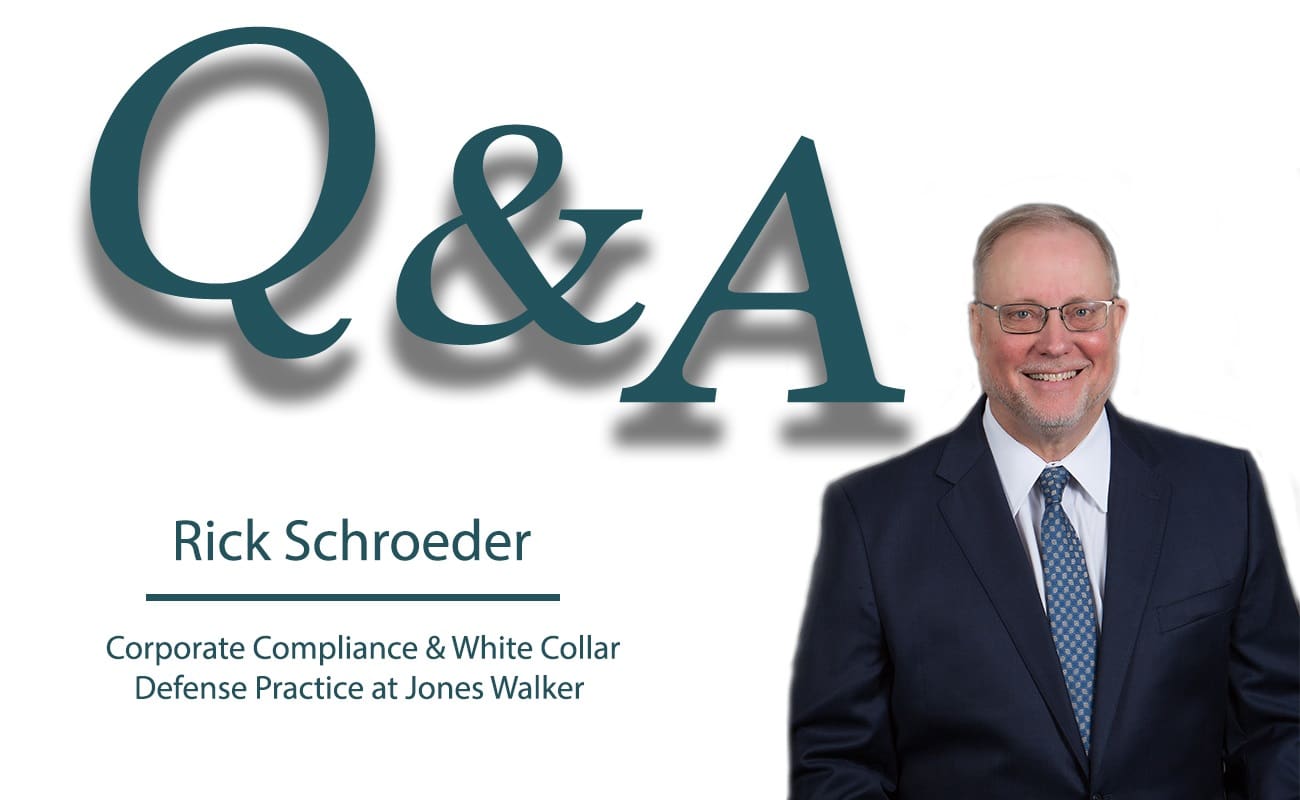Where to Start
CCI’s Maurice Gilbert interviews Rick Schroeder about what constitutes a compliance “program” versus policies and procedures, and the pair discuss first steps for a company in need of a compliance program.
Maurice Gilbert: We hear a lot about the need for companies to have a state-of-the-art compliance program. Give the reader a framework for that.
Rick Schroeder: Sure. Because every company already has policies designed to ensure compliance with some regulation or law, is that enough? Put another way, the question is, when does a collection of policies and procedures become a “program?” The simplest answer is this: when those policies and procedures are developed, approved, communicated, implemented, enforced and monitored in a deliberate and coordinated manner.
Every company has various policies designed to ensure compliance with various regulations and laws, but they do not necessarily have a “program” at all. Like an old tool shed, they may have a collection of tools they have accumulated over time. Some are useful, some are not. Some are maintained, some are not. And you may not have a complete set.
MG: So why the focus now on “programs” as opposed to “policies?”
RS: Before the early 2000s, policies often existed in silos. They often were developed and implemented exclusively by the department or division of the company responsible for the underlying activity. They had their own training protocols, their own reporting mechanisms, etc., and they were not centrally located or supervised. This was especially true of overseas divisions.
The past decade saw an enormous increase in the prosecution of white-collar financial crimes, from securities and financial fraud to public corruption cases, especially under the Foreign Corrupt Practices Act. Companies seeking to distance themselves from the individuals who committed crimes would point to internal policies as proof of the company’s clean hands. The individual offenders would claim they were not aware of the policies, or that the policies were routinely ignored. While the federal sentencing guidelines and other laws give credit to companies that have effective compliance programs, until recently, there were no standards to determine what an effective program looked like. Today, we know.
MG: What are the hallmarks of an effective program?
RS: Two primary indicators come to mind. An effective program is self-explanatory, and its implementation is well documented. By self-explanatory, I mean that a compliance officer does not have to say a word to explain her compliance program to you. She should be able to push it across the table – in binders or however it is organized and documented – and it should detail the program and all its particulars. By well-documented implementation, I mean that the implementation of the program’s mandates is documented. That means it is not a “paper program.”
For example, where training is required, the training plans and activities are documented. Where internal reporting is required, there are internal reports. When a violation is reported, the investigation and resolution, including remedial measures, are all documented. Where a periodic risk assessment is required, the risk assessment is accomplished and there is follow-up. Where annual compliance certifications are required, they are obtained, organized and, where necessary, acted upon.
There are many sources of guidance that in broad terms describe common elements of an effective compliance program, such as:
- Top-level commitment
- Risk-based policies
- Periodic risk assessments
- Communication and training
- Monitoring and enforcement
- Remedial measures and program improvement
- Third-party due diligence processes
- Internal reporting mechanisms
These elements manifest themselves through tangible items, such as:
- A chief compliance officer
- A compliance committee that meets periodically
- A compliance program document that sits over all policies
- Reports delivered quarterly to the CCO
- Reports delivered quarterly to the CEO and board
- Investigation files for all reported issues
- Training files
- Due diligence files
MG: If I am the new GC of a company that has more of a collection of policies than a real “program,” where do I start?
RS: The most important thing to understand is that, while creating the initial program does not take long, creating the best program occurs through trial and error over time. You start by reviewing what is currently in place, including policies and people, then coordinating what is in place and supplementing as necessary to create a program approach and then implementing the program. You will not achieve the perfect program right away. Every time we help a client create a compliance program, we then watch it evolve and mature over the next few years, which is exactly what the program is designed to do. Little by little it becomes more efficient and more effective. The important thing is to create the processes that will achieve those incremental improvements.
MG: Can you detail the steps you take to create those processes that form the compliance program?
RS: The steps are actually simple: review, interview, recommend and implement.
First, I like to actually start with the leadership and give them a vision of the final product: what a compliance program might look like at the end of the process, what the documents would look like and what the organization might look like. Often they are surprised (pleasantly so) that it mostly involves a rearrangement of roles and reporting structures as opposed to adding personnel.
Second, we obtain a snapshot of what is in place. For the actual process, we review all current policies and interview key managers. The policy review focuses on currency and completeness and helps us conduct a gap analysis to see what you are missing. The interviews accomplish two important goals: we learn what they know about risks, and we get their input and buy-in to the changes that are coming. They are not threatened by the process, but embrace it.
We take that information and make recommendations about how to structure the compliance organization. We are careful to leave primary responsibility where it belongs. For example, while legal may be primarily responsible for antitrust and anti-corruption, the Human Resources department is primarily responsible for HR polices, Safety for safety policies, Environmental for environmental policies, etc. The CCO does not become the owner of every policy, but at the same time exercises oversight to ensure the policies are kept up to date, employees are trained, issues are reported and new laws are addressed. Our recommendations are based on our experience with companies across many industries and often address the following:
- What the compliance organization might look like
- What the reporting structure would look like
- Proposed revisions to current policies
- New policies that should be considered
- How to coordinate training, communication, internal reporting and enforcement of polices
- Identification of additional policies for consideration based on the interview and document review process
- Development of an efficient approach to employee training
- Development of a compliance certification process
MG: Any final thoughts for a GC looking to clean up the compliance tool shed?
RS: Just that the process does not have to be disruptive. It’s a very methodical collection and coordination of what is already in place, adding tools where necessary, finding efficiencies and making incremental improvements. Once you see quarterly compliance reports coming in, with a compliance calendar showing what’s getting done when, you will sleep better at night.
 Rick Schroeder leads the Corporate Compliance & White Collar Defense Practice at Jones Walker. He is based in New Orleans. He represents local, national and international companies, particularly in the energy and natural resource sectors, and their officers and employees in business and corporate compliance matters, internal investigations and government enforcement proceedings.
Rick Schroeder leads the Corporate Compliance & White Collar Defense Practice at Jones Walker. He is based in New Orleans. He represents local, national and international companies, particularly in the energy and natural resource sectors, and their officers and employees in business and corporate compliance matters, internal investigations and government enforcement proceedings.
Mr. Schroeder has particular experience in developing comprehensive corporate compliance programs that address the broad array of high-risk areas companies face today. He has designed and assisted in the implementation of global corporate compliance programs for public and private companies with domestic and international operations, as well as conducted risk assessments and compliance program evaluations.










